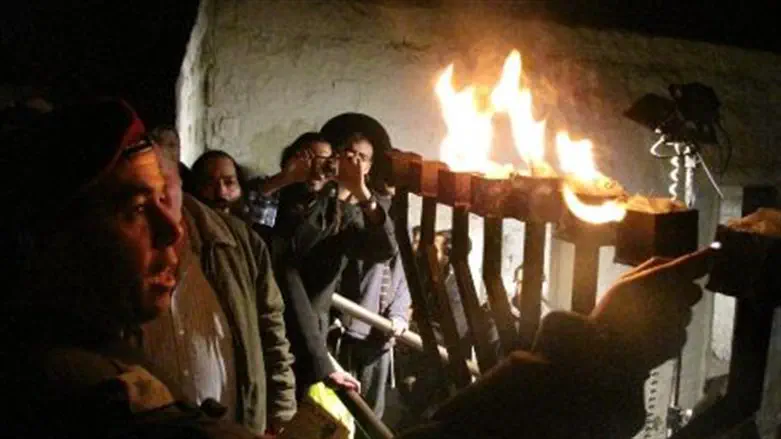
We read in our Parasha (42:1-5), that there was a famine in Canaan, and, hearing that there was food in Egypt, Yaakov sent ten of his sons, but not Binyamin, ‘to purchase from there, that we may live and not die;..So the sons of Yaakov came to buy provisions among the arrivals, for the famine was in the land of Canaan’.
The Torah then relates the seemingly capricious actions of the Viceroy - Yosef, who recognized them, but whom they did not recognize-who declared: ’You are spies..By this you shall be tested.. you will not leave here unless your youngest brother comes here’.
He then confined them for three days, and, on the third day, made the startling declaration: :’Do this and live! I fear G-d’! Let one of you remain here imprisoned, and the others may go, with provisions for the hunger of your household.. to bring your youngest brother to me, so your words will be verified..And they did so’.
How did the holy sons of Yaakov, who knew that all that happened in their lives was guided from Above- and was מדה כנגד מדה: measure-for-measure, interpret these wondrous events?
Answer: ’They said to one another:’אבל: indeed we are guilty concerning our brother, inasmuch as we saw his heartfelt anguish, when he pleaded with us and we paid no heed; that is why this has come upon us’.
Rav Shimshon Raphael Hirsch expounds:’The word אבל: always comes to dismiss a previous הנחה: view held, which till now had been accepted as clear and correct.
‘Here, by saying ‘But we were..’, it teaches that till then the brothers saw themselves as being completely blameless in their dealing with Yosef; however, they now blamed themselves for their cruelty, their lack of רחמנות: of pity, in not taking into account Yosef’s cries of anguish’.
The Ohr Hachaim Hakadosh gives us an insight, into what brought about this change:’In their confinement, Yosef’s brothers turned their minds to what could be the cause of their predicament, and could only ‘find’ the sale of Yosef, as a possible reason.
‘On further reflection, they dismissed this possibility, as Reuben was included in their predicament, yet he was not party to the sale of Yosef.
‘They therefore concluded that the cause had to be that ‘they saw Yosef’s and heard his cries’, as this occurred when they lowered him into the pit, which likely housed snakes and scorpions, and where he could well die from hunger and lack of water; and Yosef pleaded and cried out, yet all of them- including Reuben, ignored his cries, and did not take pity on him.
‘This is alluded to, in their words:’This is why this befell us’-all of us, including Reuben’.
The Abarbanel has a ‘simpler’ explanation for their conclusion: On hearing Yosef’s act of mercy, saying:‘Bring provisions for the hunger of your household’, they believed his wondrous declaration:’I fear G-d’, as he had such compassion for strangers, from another land, and this without being asked to do so by them.
‘The brothers, on hearing this, did a חשבון נפש: soul searching, and found themselves wanting; unlike Yosef’s compassion, they had shown no pity for their brother, despite his heart-rending pleas.
‘This is the purport of their words:’But we are guilty concerning our brother’, ‘when he pleaded with us, and we paid no heed’, in our cruelty, and ‘That is why this anguish has come upon us’.
‘They הצדיקו עליהם את הדין: justified that which had befallen them, as befits יראי שמים: G-d fearing brothers’.
The Alshich Hakadosh also expounds that the brothers accepted their predicament as being measure-for-measure, which is why, in their words, ‘THIS’ came upon us: because we did not listen to Yosef’s cries, the Ruler did not ‘hear’ our explanations; AND because we did not ‘see’ our brother’s distress, we were confined in a dark prison’.
Rav Shlomo Kluger offers a different interpretation, to the judgement that the brothers reached:’The brothers wondered why they were not protected by זכות אבות: ‘the merit of the Avot’, from this predicament’.
Let us sweeten the question by asking further: Our Sages teach that שליחי מצוה אינם נזקים: ‘those engaged in mitzvot, are not harmed’.
Here, as is clear from the Parasha, the brothers in descending to Egypt, were carrying out the command of their father- surely no harm should have befallen them!
Answers the Rav:’Our Sages say:’One who does not have these three attributes, the first of which is : רחמנים: pity..is not the seed of Avraham Avinu’.
‘Therefore, if a person is cruel, and lacking the attributes of the Fathers, despite being genealogically ‘the seed of Avraham’, he is not entitled to the protection of זכות אבות, as he has, by his conduct, ‘disconnected’ himself from them.
‘The brothers, when perplexed as to that which befell them- which could only happen if they had ‘lost’ the protection of זכות אבות- decided that it had to be because of their lack of רחמנות: the cruelty they exhibited, in not heeding the pleas for pity, from Yosef.
‘This is what brought them, to their confession’.
Rav Zalman Sorotzkin concludes:’The Torah, in our Parasha of the sale of Yosef, does not mention that Yosef pleaded for mercy.
‘This is because, as רחמנות is one of the signs of our people, the cruelty of the brothers in this regard, was perhaps more weighty and ‘ugly’ than the sale.
‘The Torah, in its mercy, ‘decided’ not to write it, and to give the brothers the merit of admitting it, as, by only mentioning it as part of their own Teshuva, the judgement of the brothers would be less harsh’.
לרפואת נועם עליזה בת זהבה רבקה ונחום אלימלך רפאל בן זהבה רבקה, בתוך שאר חולי עמנו.